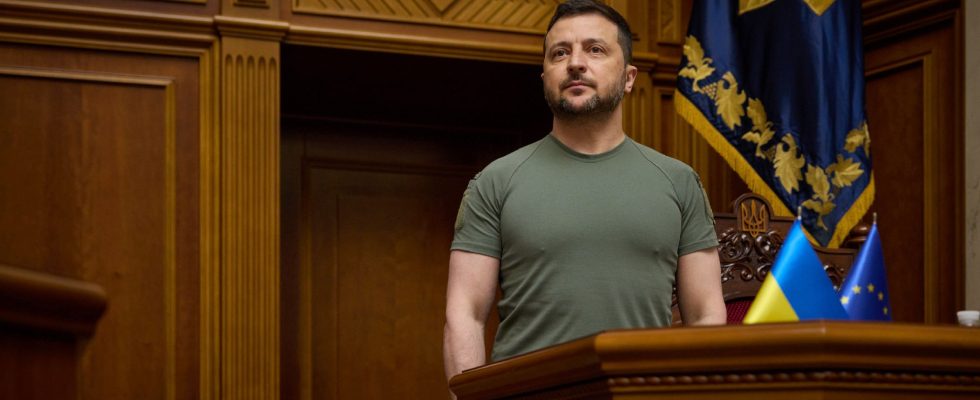Plates, cups, tea, packet of sugar… Oleksandr Salizhenko does not receive us in his kitchen, but in the archives of his organization Chesno, which campaigns against corruption in politics. In Ukraine, dishes and food have long been part of the gifts distributed to buy the votes of retired or precarious voters. Punctuated for years by incredible electoral fraud, Ukrainian political life has been democratizing since 2014. With the Russian invasion, however, civil society fears that progress hard won.
Because martial law, decreed on February 24, 2022, places the interest of the State above democracy. It makes it possible to put in place by decree restrictions on movement (curfews, prohibition for men of military age to leave the country) or to prohibit political parties. War is, moreover, the enemy of transparency. A symbol of anti-corruption reforms, the Prozorro register, an online public procurement management system that can be consulted by everyone, is finally starting to work partially again after having been put on hold for a few months.
Critics do not spare Zelensky
As for the Parliament, closed to the public because of security risks, it only meets behind closed doors. The sessions are broadcast on a deferred basis. “The first months, the Parliament formed a ‘defense coalition’, it was necessary to move quickly”, recalls Olena Chouliak, the leader of the party of Volodymyr Zelensky, the first political force since the legislative elections of 2019. “But today politics came back, she assures, with parliamentary obstruction, hours of debate…”
The opposition does not hesitate to criticize the power. And in particular the fact that the president concentrates a large part of the powers: on the government, the Parliament, the security services, the army… “It is more inspired by the Turkish leader Erdogan than by the European Union”, stings Volodymyr Ariev, deputy of the European Solidarity party of former president Petro Poroshenko, the first opponent. But he forgets to specify that it is also linked to the specificities of the 1996 Constitution, and that the presidential majority was democratically elected.
The question of the elections is nevertheless pressing, because the Parliament no longer represents public opinion, explains political scientist Volodymyr Fessenko. “Most Russian-speaking Ukrainians have radically changed their view of Russia and pro-Russian parties,” he says. In the 2019 legislative elections, the opposition Platform for Life party, led by Viktor Medvedchuk, a close associate of Putin, was the second force in Parliament. What to do today with these 44 elected officials, whose party was banned in June 2022? Its members keep their functions under the colors of new formations or as independents; but 19 of them lost their mandate (conviction in court, resignation…). In total, including Crimea and Donbass, out of 450 seats, 46 are occupied by “ghost deputies”.
No presidential next year?
Martial law obliges, Ukraine cannot hold elections, and therefore replace them. The legislative elections of October 2023 are postponed sine die. The presidential election of 2024 could experience the same fate. But kyiv is already thinking about the first votes “after the victory”, indicates Olena Chouliak. A working group in Parliament is working on the subject. “There are towns where none of the buildings where the elections were held – the school, the kindergarten… – are still standing”, breathes the deputy. The working group is examining the possibilities of voting by post or through the government application Diïa, for Ukrainians who have remained abroad.
Martial law also allowed Volodymyr Zelensky to merge virtually all television channels into a single news channel. Each channel has a six-hour slot. No more political talk shows on the channels of the oligarchs, it is the military and officials who occupy the media space. Today, the device is criticized by some. But television has declined in popularity, and online media journalists have become an important source of information. They continue to investigate corruption: one of them published an investigation in January into a case of embezzlement of funds intended for soldiers’ food. Result: six deputy ministers and five heads of regional military administrations were dismissed. Even if it needs to be strengthened, democracy is still moving.
